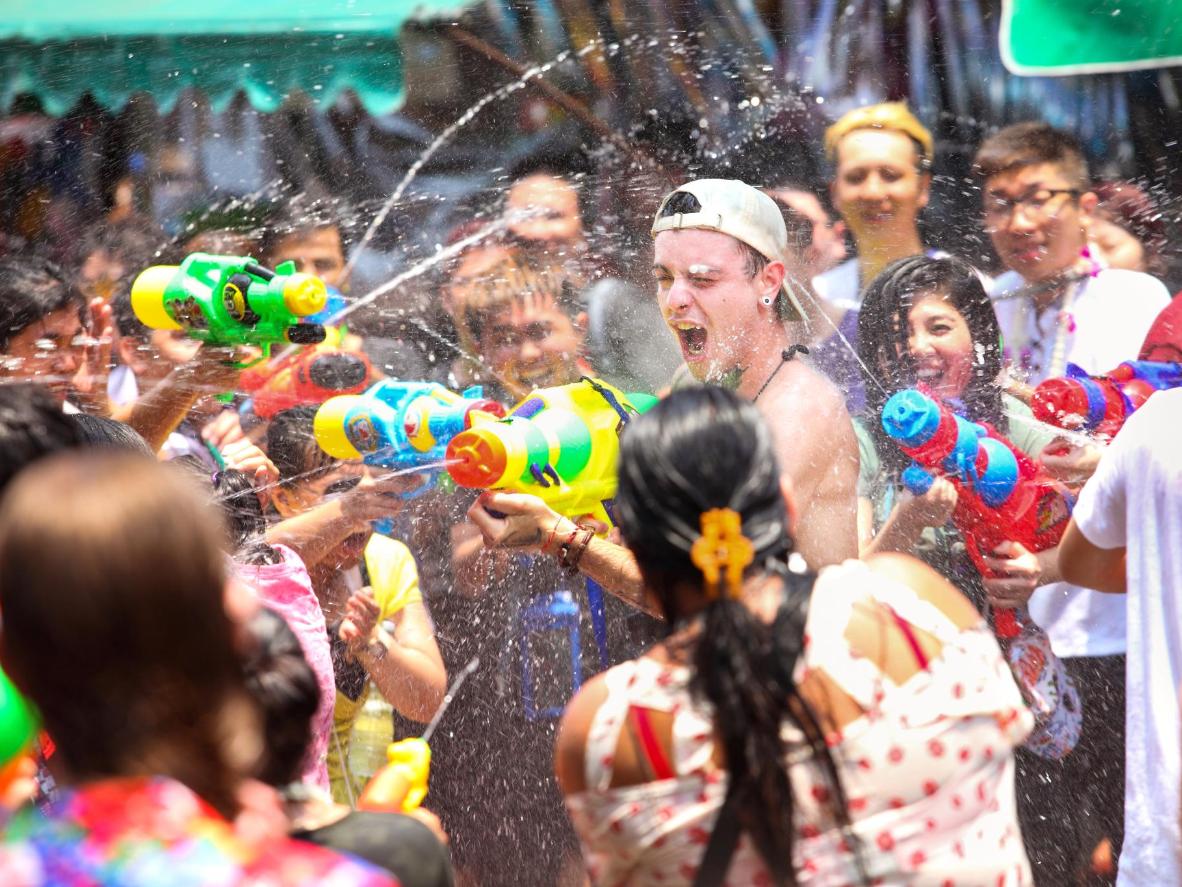Hey there! Are you curious to learn about Thailand’s vibrant and exciting traditional New Year festival? Well, get ready to be immersed in the colorful world of Songkran!
Songkran is the most important holiday in Thailand, celebrated with great enthusiasm all across the country. It marks the beginning of the Thai New Year and is not just a simple one-day celebration, but a multi-day water festival filled with joy, traditions, and community spirit.
During Songkran, you’ll witness streets transformed into giant water fights, as people armed with water guns and buckets joyfully drench each other. It’s a fantastic spectacle to see and be a part of! But that’s not all there is to the festival. In addition to the water fights, Songkran is a time for spiritual and cultural observances, as families gather to pay respect to their elders, visit temples, and make merit.
So, if you’re interested in diving deeper into the traditions and customs of Songkran, keep reading! In the upcoming article, we’ll take a closer look at the history of the festival, the significance of water, and the variety of rituals and activities that make this celebration truly unique. Get ready to be soaked in the joy and happiness of Songkran, Thailand’s traditional New Year festival!
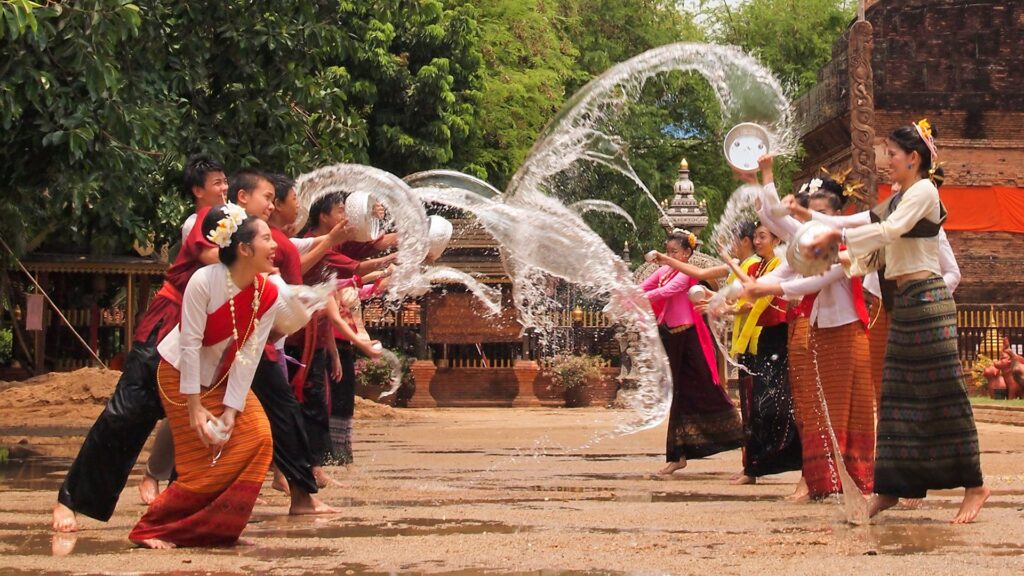
Origins of Songkran Festival
Historical background of Songkran Festival
The Songkran Festival, also known as the Thai New Year, is one of the most important and widely celebrated holidays in Thailand. It is a time of joy and renewal, marking the transition from the old year to the new. The origins of this festival can be traced back centuries to ancient Brahmanic and animistic traditions.
Significance of the festival in Thai culture
Songkran holds immense significance in Thai culture as it is a time for spiritual cleansing and renewal. The festival allows individuals to pay homage to their ancestors, make merit at temples, and spend time with loved ones. It is a time to reflect on the past year, let go of negativity, and welcome the new year with optimism and positivity.
Story behind the name Songkran
The name Songkran comes from the Sanskrit word “sankranti,” which means “astrological passage.” It refers to the transition of the sun from one zodiac sign to another. This transition usually occurs around April 13th, and it marks the beginning of the traditional Thai New Year, which lasts for three days. The word “Songkran” is derived from “Sankramana,” which means “to move or change.” It signifies the movement of the sun and the changing of seasons.
Preparations for Songkran Festival
Cleaning and purifying homes and temples
In the weeks leading up to Songkran, Thai people engage in thorough cleaning and purifying of their homes and temples. This ritual symbolizes the removal of any unwanted energy or negativity from the previous year and makes way for a fresh start. It is also seen as an act of respect to welcome the spirits of ancestors.
Creation of sand pagodas and wat phras
Another important aspect of the preparations is the creation of sand pagodas or “chedis” and “wat phras.” Families and communities come together to build intricate structures out of sand, representing Buddhist temples and pagodas. These sand structures are adorned with colorful flowers, flags, and candles, creating a vibrant and festive atmosphere.
Decorating houses and streets with colorful flags and flowers
To add to the festive ambiance, Thai people decorate their houses and the streets with colorful flags and flowers. The streets come alive with vibrant displays of creativity and traditional Thai art. The decorations symbolize good luck and prosperity for the coming year.
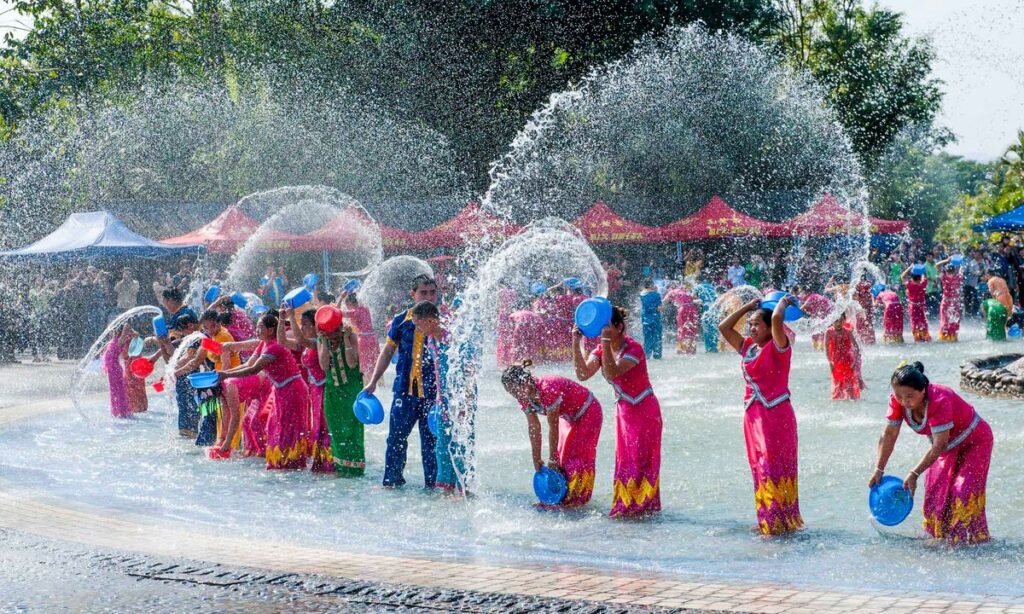
The Water Festival Tradition
Symbolism of water in the festival
Water plays a significant role in the Songkran Festival. It is considered a sacred element that symbolizes purification, cleansing, and the washing away of sins and bad luck. Water is also used to pay respect to elders and Buddha images, as well as to bring blessings and good fortune in the new year.
Water fights and splashing as a ritual
The most iconic aspect of the Songkran Festival is the water fights and splashing that takes place on the streets. People armed with buckets, water guns, and hoses engage in friendly water battles, drenching each other with water as a symbol of cleansing and renewal. This tradition is not only a way to cool off during the hot season but also a joyful and playful way of celebrating the new year.
Importance of water offerings to monks
During Songkran, Thai people take the opportunity to make merit by offering water to monks. This act of pouring scented water over the hands of monks is believed to bestow blessings and bring good luck. It is an act of gratitude and respect towards the monks who dedicate their lives to the teachings of Buddha. This tradition also allows individuals to cleanse their own spirit and seek blessings for the year ahead.
Religious and Ceremonial Celebrations
Traditional Buddhist rituals during Songkran
Buddhist temples are at the center of the religious and ceremonial celebrations during Songkran. People gather at temples to participate in traditional rituals, including chanting of prayers, making offerings, and giving alms to monks. These rituals are an integral part of the festival, providing individuals with an opportunity for spiritual reflection and deepening their faith.
Visiting and paying respects to elders and ancestors
One of the cultural customs during Songkran is paying respects to elders and ancestors. Thai people visit their older relatives, offering prayers and seeking blessings for the new year. It is a time to show gratitude and honor the wisdom and guidance of older generations. This tradition strengthens family bonds and fosters a sense of unity and respect.
Bathing of Buddha images and pouring scented water on them
Buddha images are accorded special reverence during Songkran. Thai people carefully bathe the Buddha images, using scented water and fragrant flowers. This ritual is believed to purify the Buddha images and bring prosperity and happiness to those who participate. It is a way of expressing devotion and gratitude to Buddha for his teachings and guidance throughout the year.
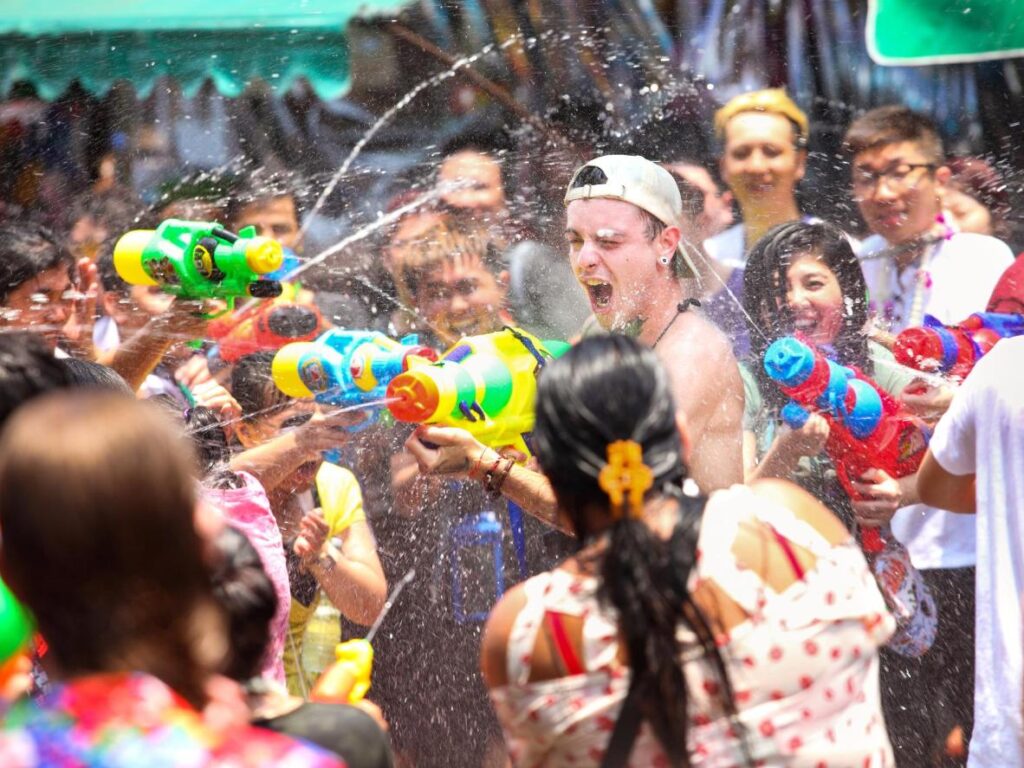
Regional Variations in Songkran Celebrations
Different customs in Northern Thailand
In Northern Thailand, Songkran is celebrated with unique customs and traditions. One such tradition is the parade of the Phra Buddha Sihing Buddha image through the streets. The image is carried on the shoulders of monks, and people line up to pour scented water over it as a gesture of respect and blessing.
Unique traditions in Southern Thailand
The Songkran celebrations in Southern Thailand often involve beautiful and elaborate processions of decorated boats on rivers and canals. These processions are accompanied by music, dance performances, and water throwing. It is a vibrant and lively celebration that showcases the cultural diversity of Thailand.
Celebrations in Bangkok and urban areas
In urban areas like Bangkok, the Songkran festivities take on a grand scale. The streets are closed to traffic, and water fights become the highlight of the celebration. Water guns, buckets, and even water trucks are used to create a fun-filled atmosphere throughout the city. Many tourists and locals alike flock to popular locations such as Khao San Road to join in the festivities.
Songkran Food and Cuisine
Traditional dishes prepared during the festival
Food holds a special place in the Songkran celebrations, with families coming together to prepare traditional dishes. One such dish is “khao chae,” a fragrant rice dish served with various side dishes and made with jasmine-scented water. Other traditional dishes include “moo chamuang,” a stewed pork dish, and “pla som,” fermented fish served with fresh vegetables.
Importance of food offerings to monks and spirits
Food offerings play an essential role in Thai culture, and Songkran is no exception. Thai people prepare elaborate food offerings for monks at temples and ancestral shrines to pay respect and seek blessings. Additionally, food is also offered to hungry spirits believed to roam during the festival, ensuring their satisfaction and appeasement.
Popular street food and sweet treats enjoyed during Songkran
Apart from the traditional dishes, Songkran also offers an array of street food and sweet treats. Individuals can enjoy fresh fruits, grilled meats, noodle dishes, and a variety of snacks available in the bustling streets during the festival. Sweet treats like “kanom tom,” sticky rice balls with sweet coconut filling, and “thong yot,” golden sweet egg yolks, are also savored during Songkran.
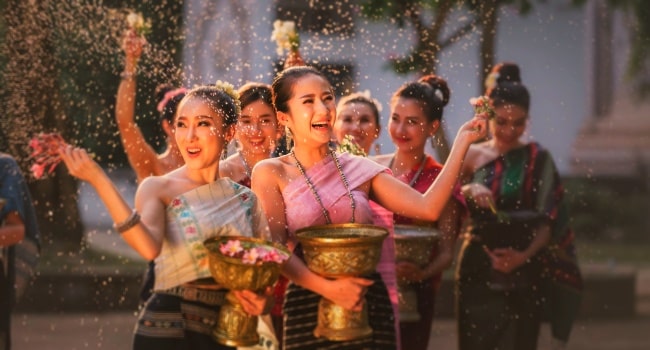
Entertainment and Cultural Performances
Traditional dances and music performances
Songkran is a time for cultural performances and entertainment. Traditional Thai dances and music performances are showcased in temples, cultural centers, and public spaces throughout the festival. These performances preserve the rich cultural heritage of Thailand and give visitors a glimpse into the country’s artistic traditions.
Processions and parades in traditional costumes
Colorful processions and parades are a common sight during Songkran. People dress up in traditional costumes, often representing mythical creatures or historical figures, and march through the streets, dancing and singing. These processions add to the festive atmosphere and provide a platform for showcasing Thai cultural diversity.
Beauty pageants and cultural competitions
Beauty pageants and cultural competitions are also organized during Songkran. These events celebrate the beauty, grace, and talent of Thai women and showcase their cultural pride. Beauty pageants often feature traditional dress displays, talent shows, and question-and-answer segments, bringing together communities and promoting local talent.
Tourism and Economy Boost during Songkran
Impact of Songkran on Thailand’s tourism industry
Songkran is a major draw for tourists from around the world, making it a peak period for Thailand’s tourism industry. Travelers are drawn to the vibrant cultural celebrations, street parties, and water fights that take place during the festival. The influx of tourists boosts the economy, supporting local businesses such as hotels, restaurants, and souvenir shops.
Economic benefits for local businesses and hotels
The Songkran Festival provides a significant boost to local businesses and hotels. Tourists spend money on accommodations, dining, shopping, and transportation during their visit. Many businesses also take advantage of the festival to offer special promotions and discounts, further stimulating the economy and creating job opportunities.
Promotion of Thai culture and traditions to international visitors
One of the invaluable benefits of the Songkran Festival is the promotion of Thai culture and traditions to international visitors. It allows tourists to immerse themselves in the vibrant and unique culture of Thailand, fostering cross-cultural understanding and appreciation. The festival serves as a platform to showcase Thailand’s rich heritage and encourages visitors to explore and learn about the country’s traditions.
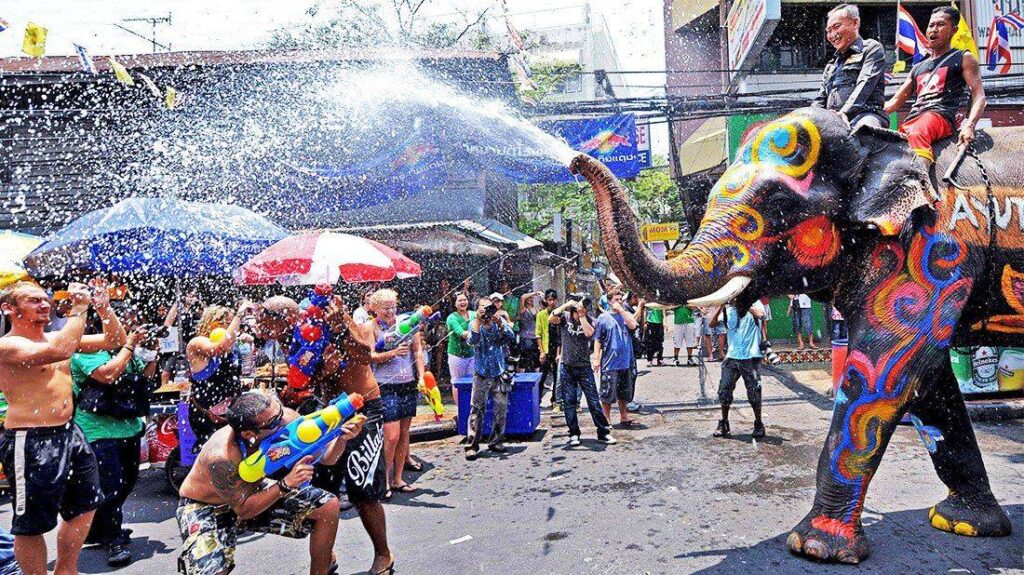
Safety and Etiquette Guidelines during Songkran
Respectful behavior and dress code during the festival
During Songkran, it is essential to observe respectful behavior and adhere to a modest dress code. Thai people traditionally dress in white during the festival as a symbol of purity and renewal. Visitors should dress appropriately and avoid wearing revealing or provocative clothing. It is also important to show respect to elders, monks, and local customs throughout the celebrations.
Public safety measures and precautions
As the water fights can become enthusiastic, it is important to practice safety measures to ensure a fun and accident-free festival. Sunscreen, sunglasses, and hats are recommended to protect from the scorching sun, and waterproof bags or phone covers can protect personal belongings from getting wet. Additionally, it is important to be cautious while participating in water fights to avoid any injuries or accidents.
Alcohol consumption regulations and responsible celebration
While alcohol consumption is common during Songkran, it is important to drink responsibly and be aware of the regulations regarding alcohol. Public intoxication or drinking in prohibited areas can result in fines or legal consequences. It is crucial to celebrate responsibly, avoiding excessive drinking and maintaining control over one’s actions to ensure a safe and enjoyable festival for all.
Conclusion
Significance and joy of celebrating Songkran Festival in Thailand
The Songkran Festival is a time of celebration, renewal, and unity in Thailand. It holds immense cultural and religious significance, providing an opportunity for individuals to reflect, cleanse their spirit, and welcome the new year with optimism and joy. The cheerful water fights, traditional rituals, and vibrant cultural performances make Songkran a must-experience celebration in Thailand.
Preserving cultural heritage through the festival
Songkran plays a vital role in preserving Thai culture and heritage. The festival showcases the rich traditions, customs, and beliefs passed down through generations. By participating in the rituals and celebrations of Songkran, Thai people ensure that their cultural heritage remains intact for future generations to embrace and cherish.
Continued importance of Songkran in modern society
Despite the modernization and changing times, Songkran continues to be a cherished and important festival in Thai society. It serves as a reminder of the country’s deep-rooted traditions, values, and sense of community. Songkran not only brings people together but also promotes cultural pride and unity, making it a symbol of Thai identity and resilience.
As you celebrate Songkran in Thailand, immerse yourself in the vibrant water fights, explore the diverse cultural performances, enjoy the traditional food, and appreciate the warmth and hospitality of the Thai people. Experience the joy and renewal that the festival brings, and take part in preserving the rich cultural heritage of this beautiful country.
